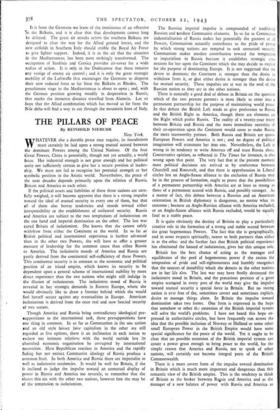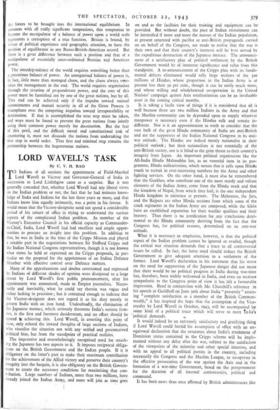THE PILLARS OF PEACE
By REINHOLD NIEBUHR New York.
WHATEVER else a durable peace may require, its foundations must certainly be laid upon a strong mutual accord between the dominant Powers among the United Nations. Of the four Great Powers, China is potentially, though not yet actually, a world force. Her industrial strength is not great enough and her political
unity not sufficiently certain to give her a secure position of leader- ship. We must not fail to recognise her potential strength or her symbolic position in the Asiatic world. Nevertheless, the peace of the next decades depends primarily upon the relation of Russia, Britain and America to each other.
If the political assets and liabilities of these three nations are care- fully weighed, it will become apparent that there is a strong impulse toward the ideal of mutual security in every one of them, but that all of them also betray tendencies and moods toward either irresponsibility or the establishment of unilateral security. Russia and America are subject to the two temptations of isolationism on the one hand and imperial domination on the other. The last war cured Britain of isolationism. She knows that she cannot safely withdraw from either the Continent or the world. In so far as British political and international experience is further advanced than in the other two Powers, she will have to offer a greater measure of leadership for the common cause than either Russia or America. The isolationist moods of America and Russia are partly derived from the continental self-sufficiency of these Powers. This continental security is in contrast to the economic and political position of an island empire, which knows its security to 6e dependent upon a general scheme of international stability by more direct experience than the two nations who might still indulge in the illusion of isolationism. The isolationist mood of Russia is revealed in her strategic demands in Eastern Europe, where she would obviously like to draw a frontier behind which she would feel herself secure against any eventualities in Europe. American isolationism is derived from the once real and now fancied security of two oceans.
Though America and Russia bring contradictory ideological pre- suppositions to the international task, these presuppositions have one thing in common. In so far as Communism in the one nation and an old style laissez faire capitalism in the other are still regarded as live options, there is an inclination in each nation to eschew too intimate relations with the world outside lest its cherished economic organisation be corrupted by international necessities. Here Republican reaction in America and the rapidly fading but not extinct Communist ideology of Russia produce a common fruit. In both America and Russia there are imperialist as well as isolationist tendencies. It would be well for Britain, if she is inclined to judge the impulse toward an unmutual display of power in Russia and America too severely, to remember that she shares this sin with the other two nations, however free she may be of the temptation to isolationism. The Russian imperial impulse is compounded of traditional Russian and modern Communist elements. In so far as Communist industrialisation of Russia makes her potentially the greatest of all Powers, Communism naturally contributes to the pride of power by which strong nations are tempted to seek unmutual security. Communism makes another contribution toward the temptation to imperialism in Russia because it establishes strategic con- nexions for her upon the Continent which she may decide to exploit for the purpose of dominating Europe. It is not suggested that the desire to dominate the Continent is stronger than the desire to withdraw from it, or ;hat either desire is stronger than the desire for mutual security. These impulses are at war in the soul of the Russian nation as they are in the other nations.
There is naturally a good deal of debate in Britain on the question which of the two present partners is most likely to enter into a permanent partnership for the purpose of maintaining world peace. In that debate the British Left tends to give preference to Russia and the British Right to America, though there are elements on the Right which prefer Russia. The reality of a twenty-year treaty between Britain and Russia and the more immediate necessity of their co-operation upon the Continent would seem to make Russia the more trustworthy partner. Both Russia and Britain are quasi- European Powers and America is not ; and no degree of political imagination will transmute her into one. Nevertheless, the Left is wrong in its tendency to write America off and trust Russia alone. Conservative opinion, as reflected in The Times for instance, is also wrong upon that point. The very fact that at the present moment most political decisions are arrived at by conference between Churchill and Roosevelt, and that there is apprehension in Liberal circles lest an Anglo-Saxon alliance to the exclusion of Russia may be in the process of formation, ought to prove that the possibilities of a permanent partnership with America are at least as strong as those of a permanent accord with Russia, and possibly stronger. As a matter of fact, this debate between a Russian and an American orientation in British diplomacy is dangerous, no matter what its outcome ; because an Anglo-Russian alliance with America excluded, or an Anglo-Saxon alliance with Russia excluded, would be equally fatal to a stable peace.
It is quite obviously the destiny of Britain to play a particularly creative role in the formation of a strong and stable accord between the great hegemonous Powers. The fact 'that she is' geographically, and in some respects spiritually, nearer to both partners than either is to the other and the further fact that British political experience has eliminated the hazard of isolationism, gives her this unique role.
Britain has the best chance of acting as . the manager and equilibrator of the pool of hegemonous power if she resists the temptation of pride and self-righteousness and huMbly recognises that the sources of instability which she detects in the other nations are in her life also. The last war may have finally destroyed the isolationist mood in Britain, and the precarious position of a great empire scattered in every part of the world may give the impulse toward mutual security a special force in Britain. But no strong nation is ever free of the, sometimes covert and sometimes explicit, desire to manage things alone. In Britain the impulse, toward domination takes two forms. One form is expressed in the hope that somehow or other the extension of the British imperial system will solve the world's problems. I have not heard this hope ex- pressed in authoritative circles, but have frequently run across the idea that the possible inclusion of Norway or Holland or some other small European Power in the British Empire would have some special significance for the peace of the world. Yet it ought to be clear that no possible extension of the British imperial system can create a power great enough to bring peace to the world, for the simple reason that America and Russia, not to speak of other nations, will certainly not become integral parts of the British Commonwealth.
There is a more covert form of the impulse toward domination in Britain which is much more important and dangerous than this romantic view of the British empire. This is the tendency to think of Britain as the broker between Rtvsia and America and as the manager of a new balance of power with Russia and America as the forces to be brought into the international equilibrium. In common with all really significant temptations, this temptation to become the manipulator of a balance of power upon a world scale represents a corruption of a true function. Britain is bound, by virtue of political experience and geographic situation, to have the position of equilibrator in any Russo-British-American accord. But there is a great difference between such a position and that of a manipulator of essentially unco-ordinated Russian and American power.
The interdependence of the world requires something better than a precarious balance of power. An unorganised balance of power is, in fact, little more than managed chaos, and the chaos always ovtr- takes the management in the end. The world requires organisation through the creation of preponderant power, and the core of this power must be furnished not by one of the great nations, but by all. This end can be achieved only if the impulse toward mutual commitments and mutual security in all of the Great Powers is triumphant over the competing impulses toward irresponsibility or domination. If that is accomplished the next step must be taken, and ways must be found to prevent the great nations from jointly using their common power merely for domination. But the fear of this peril, and the difficult moral and constitutional task of countering it, must not dissuade the nations from undertaking the first step in world order. That first and minimal step remains the partnership between the hegemonous nations.



























 Previous page
Previous page